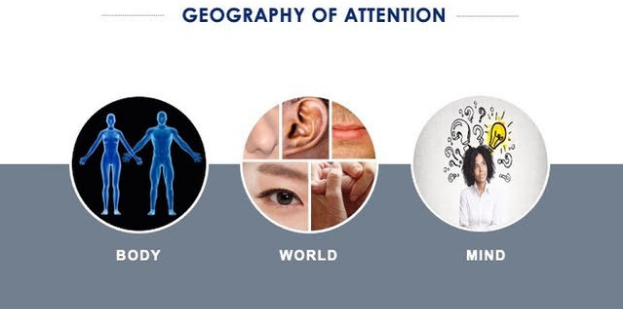How to Manage Your Attention in a World of Distraction

By Mike Normant, guest contributor
You've engaged a mindfulness routine, and now you’re never disrupted by noise encountered in this busy world, right? Actually, I’m kidding...
Focusing your attention amidst life’s constant distractions is incredibly challenging, even for advanced practitioners. Hour to hour and day to day, it’s difficult not to get lost in thought or be pushed and pulled by the next interruption.
So that’s where the “superpower” of managing your attention comes in. I’d like to introduce you to a few ideas related to managing your attention that can help you to be more mindful in all situations. (And maybe even while you meditate, if that's your practice.)
Before getting into specifics, let’s start with these underlying principles:
(a) What you pay attention to defines your experience.
(b) Your life is a collection of experiences.
(c) It’s a straight line between these two points: shifting your relationship with your attention can be life-changing.
Now onto some powerful ideas that forever changed my understanding of–and how I experienced-my attention. You too may find that these ideas spark new possibilities for being more mindful.
First, attention is subjective.
I can have a shared experience with you (e.g., watching a movie or sporting event, enjoying a group meal, etc.) yet my experience is different from yours, in part because of “where” my attention goes.
Second, attention is dynamic. It’s “on the move.”
As you start to pay attention to your attention, you will see that it moves with or without you, meaning with or without your conscious involvement. Stop! Think about this for a moment. Once I let this concept sink in, it was a game-changer for me.
Third, there is a geography of attention.*
It’s helpful to understand that there is a common “geography” or “landscape” that attention moves in and through. This knowledge helps you locate your attention at any given moment.
Location 1 – Your Body: Attention can focus on your feelings or sensations of your body. Feeling happy or sad, feeling your heartbeat, feeling your breath in your abdomen or nostrils, feeling your butt on your seat, etc.
Location 2 – The World: Attention can be in the world (or more accurately, your world) as experienced by you directly through your five senses. You can be focused on something you see, hear, smell, touch, or taste.
Location 3 – Your Mind: Attention can focus on your thoughts, e.g., “I’m excited to see my aunt tonight!”, “I can’t believe what I said at the dinner table yesterday.”, etc.

Pay Attention to Your Attention
I encourage you to start paying attention to your attention.
- Start small, like 5 minutes per day.
- Begin to become more familiar with your own experience of the geography of attention.
- Ask yourself, where is my attention right now? Is it on my body, the world or my thoughts?
As you become more aware of your attention, you’ll have more capacity to manage it.
Managing Your Attention is Your Superpower
Managing your attention is a learned set of skills. It’s also a superpower for life–both for your moment-to-moment living and your entire life. Essentially, it’s about being able to control or direct your attention “on demand”:
- Notice when your attention has drifted and non-judgmentally “bring it back”
- Bring yourself to the present moment “on demand.” By paying attention to your attention, you’ll become more aware of when your attention is not where you want it to be
For example, say you are in a Zoom meeting, and you notice that your attention is in your mind, worrying about an upcoming difficult conversation. You can kindly(!) say to yourself, “Oh, my attention has wandered, and I want to bring it back to this meeting,” and then you can reset yourself.
Bring Yourself to the Present Moment
“Being present” or “being in the present moment” is a key aspect of managing your attention. It’s an idea found throughout ancient wisdom traditions and philosophies that means you are not ruminating about the past or worrying about the future. Your attention is focused on the now.
That all sounds good, but I have discovered that you can’t just “be in the present moment” without knowing HOW to get there.
Here’s where the geography of attention is helpful. Putting your attention on either your body or your world instantly brings you to the present moment. In fact, you cannot feel a bodily sensation, listen to a sound or see something, etc. at any other time than the present moment. (Take a moment and think about that one!)
So, to be present, you simply have to bring your attention to:
- Your body (i.e., any bodily sensation), or
- Your world (i.e., any direct experience with one of your five sense)
Practices for Strengthening Attention
- Spend five minutes a day bringing yourself to the present moment (by bringing your attention to your body or your world). This can be done in 10-30 second intervals.
- When you catch that your attention is “elsewhere,” non-judgmentally bring it back to where you want it to be, like the Zoom meeting example described above.
One note of caution–strengthening your attention is not about always being in control of attention. It’s about controlling it more often, hopefully, “on demand.” It takes practice. It is a practice.
Remember, how you manage your attention has a BIG impact on your life. As you direct your attention more regularly and start to spend more time in the present moment, you will notice a positive shift in your experience. Benefits can range from becoming less susceptible to the myriad distractions coming at you, reducing your stress levels, and improving your productivity.
There really is a superpower here waiting to be developed!
Mike Normant is the CEO of The Unlimit Group, an executive coaching and leadership training company he launched in 2016. He is also on the faculty of InnerProfessional and has worked closely with leaders from corporations large and small. Before launching The Unlimit Group, Mike led global learning & development at both eBay and ServiceSource.
*The geography of attention is based on the work of Gary Sherman. I’m grateful to Gary for his graciousness in allowing me to use his material.

2 comments
Excellent read and loaded with practical skills for developing attention. Thank you!
Thanks for your kind words, Jana. I'm glad you found this helpful.
Leave a comment